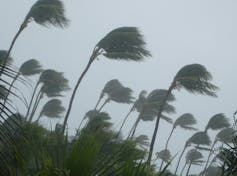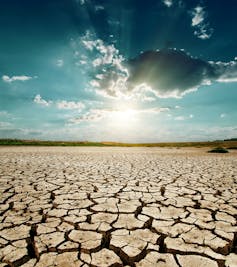Our perennial, ideologically-driven squabbling over whether and how to reduce carbon emissions is generally couched in terms of GDP, jobs, commercial competitiveness, household expenses and property safety. All are important, but the discussion is short-sighted, given the threat of unabated climate change to the very basis of population welfare, health, survival and social stability.
Human-induced warming is increasing the likelihood of serious social and public health emergencies in Australia. In the near future, intensified extreme weather events (heatwaves, fires, floods, storms) will cause injuries, deaths, respiratory ailments, post-event infections and serious mental trauma.
In the coming decades, climate change will exert much of its health impact on whole communities, via disruptions of environmental and social systems. These include:
-
Shifts in the range and seasonality of various infectious diseases (such as salmonella food-poisoning, mosquito-borne dengue and Ross River viruses)
Reduced farm yields in areas experiencing long-term changes in rainfall patterns – with implications for food adequacy and nutritional status (especially in lower-income households), rural community morale and mental health

Lack of freshwater in urban settings, threatening dehydration and poor hygiene
Probable increases in regional migration and refugee flows, accompanied by a panoply of risks to health and social harmony.
Awareness of the mounting risks to population well-being and health is a prime reason for reactivating public discussion of “climate change” and foregrounding it in this election debate.
Historical climate variability
Human societies have long experienced changes in climate. Natural climate changes over the past 11,000 years have caused many acute shocks to human societies. These have reflected the influences of natural climatic conditions, ranging from centuries-long fluctuations in prevailing climate, to acute extreme El Niño events (brief hot and dry periods) and volcanic eruptions.
Europe’s Great Famine of 1315-1322 resulted from the unusual confluence of three consecutive years of severe harvest-damaging weather; food supplies halved and grain prices tripled.
The Super-El Niño of 1789-93 had disastrous impacts on health, survival and conflict in several regions of the world. These included influences on the food shortages that fomented the French Revolution and the extreme heat, aridity and food shortages that afflicted the Sydney Cove colony in 1790-91, two years after its arrival in the First Fleet.
Today, we are superimposing a large increment of rapid warming – and associated increased climate variability – on whatever background variation is occurring.

There is coherent international evidence of a recent increased tempo and severity of most types of extreme weather events around the world. Rich countries – such as Australia (with heatwaves, floods, fires), the United States (with widespread drought, wild fires, superstorm Sandy) and northern Europe (with floods and extreme cold winters due to warming-related shifts in wind patterns and the northern polar jet stream) – are clearly not immune to disastrous human impacts.
The Australian Climate Commission’s 2013 reports on The Angry Summer and The Critical Decade: Extreme Weather pull no punches about the scientific evidence of an underlying influence of climate change on the extreme weather events, stating:
Australia has always been a land of extremes. However, the basic features of the climate system have now shifted … We live in a hotter climate than 50 years ago, and this extra energy in the system is influencing many types of extreme weather events.
Future threats
Increased exposures to extreme weather events loom as the most likely source of a climate-related emergency in Australia. Our health system and emergency services may quickly find themselves unable to cope with such shock events. In Adelaide, during the late January 2009 heatwave, the morgue could not handle the extra deaths and commercial freezer vans were hired.
Our health sector remains under-engaged and somewhat ambivalent about the potential severity (and somewhat unfamiliar) risks to population health posed by climate change. Indeed, the natural focus of our modern health system is on the diagnosis, treatment and counselling of individuals and families. Much less attention is paid to helping society build for and ensure the long-term health and well-being of the community at large.
Further, the health effects of climate change are viewed as “environmental”, and don’t fit the prevailing budgetary and policy templates.
Meanwhile, we lack systematic knowledge of which sub-populations and locations in Australia are most vulnerable, especially from extreme weather events. Some links are obvious, such as between frailer elderly people and heatwaves and coastal dwellers facing storm surges, but there is much more that we simply don’t know.

The Australian Department of Defence is paying greater attention to future risks of climate-related disasters and geopolitical crises than other relevant sectors such as environment, health and infrastructure. A 2013 strategy report for the Australian Defence Forces underscored the likely climate-related emergency demands it faced, along with the prospect of climate-related conflict within our region.
In the United States, Admiral Samuel Locklear III, who led the naval action in Libya, predicted recently that a significant global warming-related event is what is most likely to “cripple the security environment.”
A shared public understanding of these potentially great risks to the human social-ecological system should now be reinforcing the urgent need to take national preventive action.
This will require an extraordinary trans-political response, comprising strong leadership from the Australian government via open and community-engaged discussion of this fundamental threat to human societies, their populations and the natural environmental systems that supports all life.
Within the health system, while immediate needs for affordable services must be addressed, there should now be better-informed planning, genuine engagement with other sectors to optimise responses to already-existing risks, along with an accelerated reduction of the sector’s carbon-intensive footprint.
We have a planet to manage, not just a local economy. Climate change and its threats to human health, survival and social stability should be at the top of the election agenda – and with at least a hint of bipartisan understanding and strategic agreement.

